
Cedar N. Goslin
The Broadside
In February of 2011, a new edition of Mark Twain’s “The Adventures of Huckleberry Finn” is due to be published by Auburn University professor Alan Gribben and NewSouth Books.
The difference between the new addition of Twain’s classic novel and the original, which was published in 1884, is that the “N-word,” which is frequently used in reference to African Americans in the book, will be replaced with the word “slave.”
Though the “N-word” is widely considered to be offensive and inappropriate, there is a great deal of controversy over its removal.
Some believe that by altering the language in the book, the story loses its intended meaning and historical context.
“By taking words out like the “N-word,” we’re losing our chance for discussion…” said Chelsea Ramsey, an Oregon State -Cascades student who is majoring in early childhood development. “We are not allowing our children to come to us for questions, we’re completely dropping the historical context.”
The book “The Adventures of Huckleberry Finn” follows the happenings in the life of a young boy, Huck, and takes place mainly along the Mississippi River.
The book is about the growth of Huck as he travels with an escaped slave, Jim. Huck must learn the values of society and decide how they match up with his own, and one of the biggest moral questions Huck must face is that of whether or not to turn Jim in for running away.
Over the course of the book, Huck’s opinions of Jim, slaves in general and slavery begin to change.
However, according to the scholars releasing the new edition, the point of replacing the controversial language is not to take away from historical context, but to protect at least one version of the book from being banned from high schools.
The argument for releasing edited versions of The Adventures of Huckleberry Finn is that with the questionable language still in place, it runs a risk of being banned from the schools it would normally be taught in.
By removing the offensive words, Huck Finn may have a greater chance of being read.
“This is not an effort to render Tom Sawyer and Huckleberry Finn colorblind,” said Gribben in an interview with Publisher’s Weekly. “Race matters in these books. It’s a matter of how you express that in the 21st century.”
Though everyone has their own opinion on whether or not an edited version of Twain’s classic novel should be released, there are some who can see the pros and cons of each side.
“I suppose I think that would make the book palatable for others,” said Annemarie Hamlin, an American Literature professor at COCC, though she personally thinks that removing the language from a book that is about a person changing their perspective makes the piece lose its meaning.
“If you’re studying race in America, it’s a shame to remove it. If you’re just interested in a story and nothing deeper, then there’s probably a place for that.” said Hamlin.













